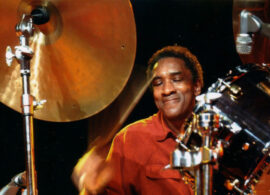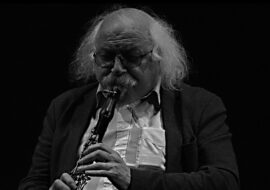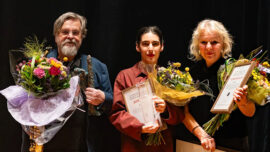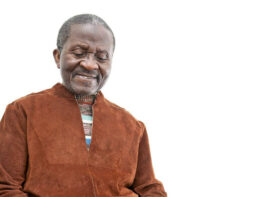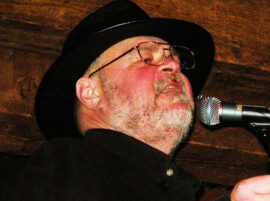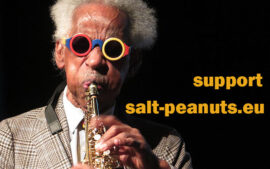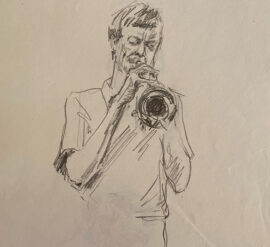
Camila Nebbia is a classically-trained saxophonist, composer, bandleader, and multidisciplinary artist from Buenos Aires, Argentina. American reeds player Ben Goldberg, who taught her in one of her residencies, tells about her: «when she plays the saxophone you can hear the whole world opening up to greet you». Nebbia also participated in residencies led by Tim Berne and Marilyn Crispell, in a workshop directed by Ralph Alessi and studied with Tony Malaby and Kris Davis.
«Aura» is Nebbia’s third album as a leader, recorded in Buenos Aires in 2109, and realizes best her singular and bold sonic vision. She experiments and investigates the relations between distinct forms of composition and free-improvisation with her Argentinian ten-musicians band, blending and contrasting complex ideas, and compositional strategies from contemporary music with modern jazz. She does so with a great sense of drama and with a strong feminist agenda.
«Aura» begins with «Las manos» (The hands), dedicated to «all of Nebbia’s woman ancestors, who have lived with oppression and gender violence» and «a tribute to all women who fight to live in a more equal world». Nebbia’s band erupts throughout this powerful and intense piece that feels like Nebbia studied carefully the work of Berne and the musical legacy of the Association for the Advancement of Creative Musicians (AACM), especially of Anthony Braxton, but transforming these seminal influences into a personal language of her own. The following 18-minutes chamber suite «Algunos rastros de la memoria» (Some traces of memory) is conducted by Juan Klas and inspired by all the things that Nebbia experienced in her life because of her gender. Nebbia employs the whole orchestral palette of her band through this cerebral yet arresting piece while sketching multilayered, chamber episodes. The band improvises over a brief melodic theme throughout fast-shifting, subtle, and often contrasting orchestrations, variations, and dynamics with great focus on sound and timbre. Later, the tentet also improvises with a fragment of Federico García Lorca’s play «Doña Rosita la soltera o el lenguaje de las flores», where some of the questions are «why can’t a poor woman breathe with freedom?». Nebbia already incorporated poetry and spoken word in her solo album «De este lado» (2019).
«La desintegración» (The disintegration) is based on a graphic score with conduction techniques borrowed from Butch Morris, and simulates the physical process of disintegration in which some particles transform into others. Nebbia’s tenor sax articulates the dense, playful theme after deconstructing the dense and complex interplay of the band. «La quietud del viento» (The stillness of the wind) is dedicated to or Camila’s aunt grandmother and was written during her last days. This piece suggests an oasis of tranquility and contemplation «inside the chaos that the body experiences when leaving this world». Nebbia’s experiments here with two, dueling rhythmic sections, played by drummers Axel Filip and Omar Menendez, and divides her band into high-pitched instruments and low-pitched instruments, but eventually all musicians join into a lyrical, emotional coda. The last piece, «Al costado del río» (By the riverside), is anchored by the bass playing of Juan Bayon, and was written as a «representation of everything that happens on the side of what one believes is ‘natural’ like the flow of a river, all the injustices, and violence in life». And like real life, all the solo segments are intervened abruptly by some of the musicians until the whole band unleashes a collective improvisation inspired by Morton Feldman with minimalist long, and sustained sounds.
And Ben Goldberg concludes: «These days a lot of people are looking for something to believe in, looking for knowledge and peace, looking for something real. Camila Nebbia is the real thing. You can believe in her».
Eyal Hareuveni
Camila Nebbia (ts), Valentin Garvie (tp), Ingrid Feniger (bcl, as), Daniel Iván Bruno (tb), Damián Bolotín (vio), Violeta García (c), Juan Bayon (b), Mariano Sarra (p), Axel Filip (dr), Omar Menendez (dr), Juan Klas (cond)























